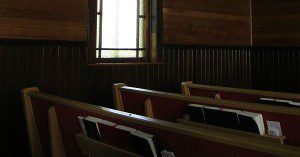This is funny and great. Well, by ‘funny’ I mean ‘isn’t it funny what lying liars we humans are,’ and by ‘great’ I mean the exact opposite of that.
Year after year, 40 percent of Americans tell Gallup pollsters they attended church or synagogue in the past week. Yet church membership has remained flat while the population has grown.
This totally happens to me occasionally as I wander about my town. I will run into a stranger upon whom I have never set eyes, fall into easy and pleasant conversation, divulge that I am closely attached to my small church where everyone knows everyone else’s name and face and where they live and what they like to eat for breakfast, and discover from the stranger that the church where I go almost every day for one reason or another is also, miraculously it seems, ‘their church.’ ‘Oh, that’s my church!’ the complete stranger will say. And I will open wide my eyes in complete astonishment and wonder if I am living in some alternate universe.
The researches in this study did their initial analysis, but it was so shocking they didn’t believe it, and so took just one large church, a sort of evangelical big box one, and tried again.
The results confirmed their thesis. Of the 300 people interviewed, 209 said they attended worship the previous Sunday, or about 70 percent. But if 70 percent of the members had indeed been at church, attendance should have been 1,710. In fact, it was 984. Researchers expected some misreporting, so they asked the 209 members who said they had been at church if they attended a worship service or some other type of church meeting. When asked in this way, 182 members said they participated in worship. But even that self-reported attendance total remains too high — at 61 percent. Had 61 percent of church members been at services there should have been 1,489 heads at worship and not 984.
What’s so great about this is that churches literally count their people on Sunday mornings. Like, someone in the church is counting and writing it down in a book. At GS, that’s both the ushers and me. The ushers take a straight count and then the number of people who receive communion. I write down everyone’s names—both who is there and who is not there—in a little book acquired for the purpose. That’s so we can call people and make sure they’re ok when they don’t show up after many weeks. Often people get sick or have bad things happen and don’t remember to call the church to say they’re in trouble, sorrow, need, sickness, and all the other adversities that beset us all. Counting the people who belong to the church is one way that people who work in the church manage to go to sleep at night—it’s called ‘counting the sheep’ (Just kidding, that’s a terrible pun, but also, I am So Not Kidding. If you don’t know if you’re people are ok, you can’t sleep at night).
So anyway, the researchers wanted to understand more, because it really shocked them that people associated with churches might lie about it.
People who say they attend church frequently are more likely to misreport their Sunday School attendance. Conversely, those who say they attend church infrequently are less like to misreport Sunday School attendance.
In this way, the researches discovered that people who go to Sunday School are just like the rest of humanity who “tend to overrate desirable behavior.” As in, if you think something is good, you will say that you do it even if you don’t actually do it. The researchers hasten to add that this isn’t necessarily ‘lying,’ it’s just that your perception of yourself means that you believe you do good things, and if you believe that church is good, in your own mind, you totally go there, just like in my mind, since I only live 3 hours away from NYC, I totally go there for fun stuff even though I never actually do that. I only go to JFK (technically in NYC tho) once every five years.
Here is the kicker. The researchers conclude that
So long as people hold church in great esteem they will exaggerate their attendance at worship. But the results of these two studies have other implications as well. They suggest that inflated church attendance figures have produced a distorted image of religion in America. “If real,” the researchers concluded, “a large attendance gap suggests that many assumptions about the robustness and exceptional nature of religion in America should be modified.”
And there it is. Well, if you’ll excuse me, I’m going to go ‘take a walk’ by which I mean ‘eat some cold tater tots straight from the fridge while I try to distinguish my right hand from my left hand.’ See you in church! (Just kidding, I’m not going there today.)













